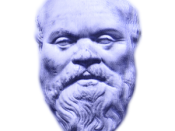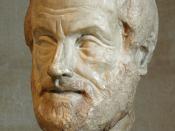This paper was written for a class on connection between philosophical views on nature and its social habits None
Aristotle: A Comprehensive View on Nature and Society
In order to fully understand Aristotle's views on a natural system, it is necessary to first explain some general principles of his philosophy. It is in his work the Categories that Aristotle presents the concept of substance, a concept which will serve as the foundation for much of his philosophical system. Substance, for Aristotle, is not a universal, but rather, it is the particular; substance is not a "such," but a "this." Thus, substance is neither in nor is it said of a subject (as are qualities). Rather it is that which makes the subject numerically one; it is that which makes the subject the individual. Substance is 'an individual man and [or] an individual horse.' Aristotle still classifies universals as substances, for they define what constitutes the substance, and without these universals, a substance would not be what is.
There are four characteristics of substances: a substance is a "this", not a qualification or a 'such' (which stresses individuality); a substance has no contraries to it (there are no opposites of a substance); a substance does not admit more or less (there are not degrees of a substance); and a substance can admit contraries while remaining numerically one.
In the Physics, Aristotle addresses that which constitutes Natural Objects as substances. He states that all Natural Substances consist of both form and matter. Matter is that out of which the substance arises and form is that into which the matter develops. In building a table, the wood, nails, etc., are the matter, and the idea of a table, what the end result will be, is the form, according to Aristotle. Matter and form...


